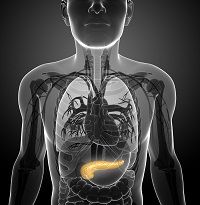Mobilizing Immunotherapy for Type 1 Diabetes: On the Horizon
Type 1 diabetes mellitus is an autoimmune disease in which the body destroys all or part of its own roughly 1 billion β cells and cannot regenerate these critical endocrine components. Researchers have turned their attention to immunotherapies for treatment, postulating that targeting the immune system might restore β-cell function. It appears that combination therapies may be needed since clinical trial results have not met expectations based on animal studies.

Type 1 diabetes mellitus (T1DM) is autoimmune in nature, and generally occurs when the body destroys all or part of its own roughly 1 billion β cells and cannot regenerate these critical endocrine components. Various mechanisms are involved in β-cell destruction. Researchers have turned their attention to immunotherapies, postulating that targeting the immune system might restore β-cell function. It appears that combination therapies may be needed since clinical trial results have not met expectations based on animal studies. A review article published ahead of print in Nature Reviews in Endocrinology speaks to this issue and summarizes current evidence about combination immunotherapies in T1DM.
The authors note that in humans, T1DM is a heterogeneous disease, a characteristic that may have complicated clinical trials to date. BMI, HbA1c, age at onset and genetic susceptibility seem to influence the degree of β‑cell function at diagnosis. They are also key determinants of the rate of β‑cell loss in the years after disease onset. An additional stumbling block is our current inability to measure β-cell mass and capacity accurately. And, the slow rate of β-cell regeneration in humans limits immunotherapy’s efficacy.
In an effort to improve clinical trial results, researchers are assembling promising combination therapies with the lofty goal of curing T1DM.
Using immunomodulators with agents that stimulate β‑cell regeneration might restore normoglycemia, and is one of the most clinically important approaches under consideration. To date, studies have been conducted using teplizumab, rituximab, and otelixizumab and found some delay in β‑cell function decline. The results have not been as robust as researchers would like. Teplizumab’s innovator company abandoned it after phase III trials, and otelixizumab is still being studied. Although researchers consider T1DM T-cell-mediated, rituximab’s activity suggest that B-cells play a critical role in disease.
The authors note that combining dipeptidyl peptidase 4 (DPP‑4) inhibitors and proton pump inhibitors (PPIs) with immunomodulators might be an effective strategy. This theory is based on 3 mechanisms that alter β‑cell regeneration: self-replication of mature β‑cells; neogenesis from ducts; and transdifferentiation of acinar cells. Gastrin determines islet hyperplasia, and GLP‑1 induces replication of differentiated β‑cells. PPIs and DPP‑4 inhibitors increase gastrin and GLP‑1 levels, stimulating β‑cell regeneration indirectly.
Researchers are exploring novel pathways to guide future combination therapies. For the time being, personalized therapy is needed for each T1DM patient using combinations of available drugs and biologics.